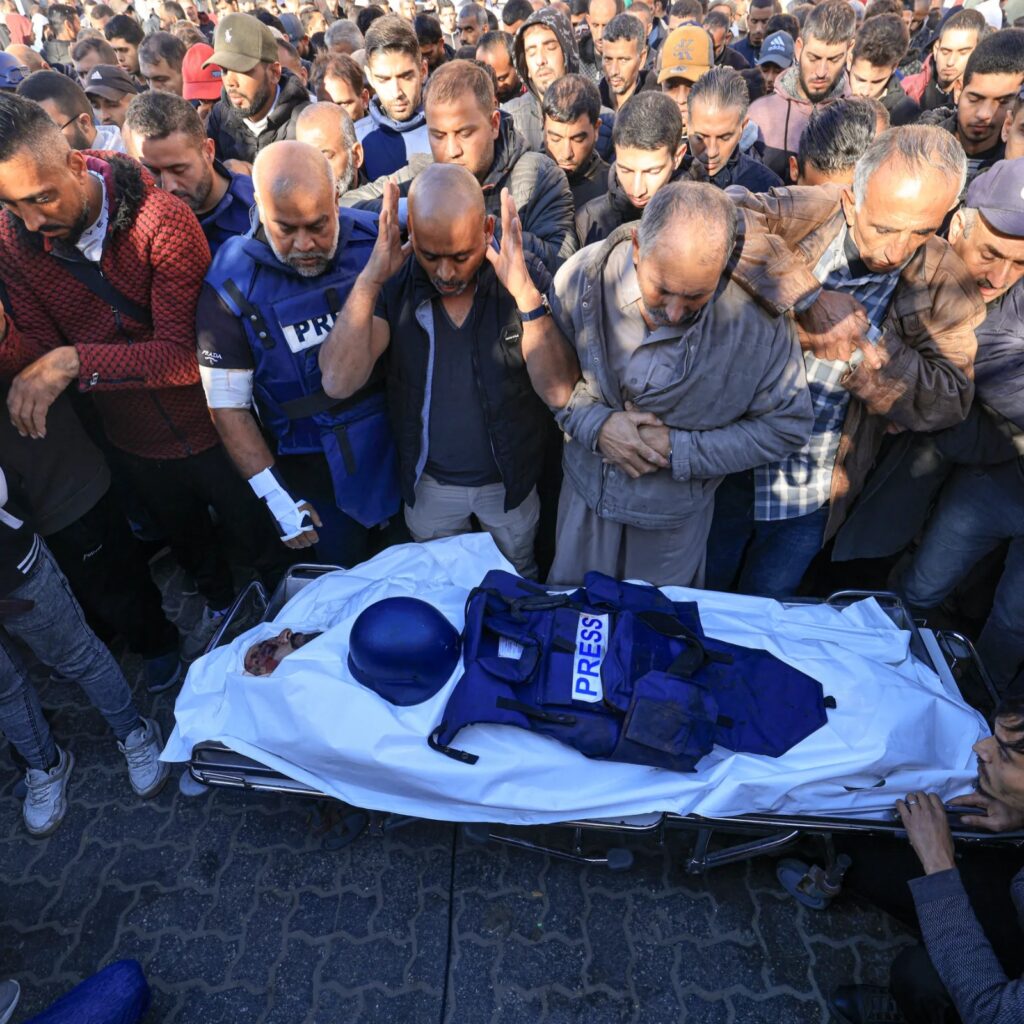
By Imraan Buccus
War has been part of human history for millennia. But even war has rules. Since ancient times there has been a deep moral aversion to killing civilians, and especially women, the elderly and children. In modern times international humanitarian law, codified most clearly in the Geneva Conventions and their Additional Protocols, draws a bright red line between combatants and civilians. It is explicitly prohibited to target civilians, and special protections are afforded to the most vulnerable, including children.
Journalists, as civilians engaged in the essential task of informing the public, are recognised as protected persons. So too are medical personnel, whose work is safeguarded under the First and Fourth Geneva Conventions and who must be allowed to treat the wounded without obstruction or attack. These protections are not optional—they are binding obligations ratified by the overwhelming majority of the world’s states, including Israel.
The Geneva Conventions emerged from the devastation of the nineteenth and twentieth centuries, shaped by the understanding that even in war, there must be limits if humanity is to survive its own violence. They apply equally to all conflicts, regardless of the justifications given. Violations—such as deliberately targeting civilians, children, journalists, or medics—are not simply breaches of protocol; they are war crimes.
In Gaza, the evidence of such violations is overwhelming. Credible estimates now place the death toll in Gaza well above 90,000, with women, children, and the elderly making up the majority. The number of children killed is believed to be in the tens of thousands, and many of the dead were non-combatants killed in their homes, schools, and hospitals. When indirect deaths from starvation, disease, and the collapse of healthcare are included, some credible estimates suggest the true toll could be in the hundreds of thousands.
Since October 7, 2023, well over 200 journalists and media workers have been killed in Gaza, nearly all Palestinians reporting from inside the besieged territory. This is a calculated erasure of witness, testimony, and accountability. On 10 August Anas al-Sharif and four of his Al Jazeera colleagues were killed when an Israeli airstrike hit their media tent outside al-Shifa Hospital in Gaza City. Israel openly admitted that they had been deliberately targeted.
The Committee to Protect Journalists places the death toll of journalists at approximately 192, nearly all Palestinians, and notes that at least 20 were directly targeted—a potential war crime. The International Federation of Journalists confirms more than 180 media workers killed. Reporters Without Borders offers even higher figures, placing the toll at over 220, or as high as 237, since October 2023.
UN and media analyses show that more journalists have died in Gaza in the past two years than in all major wars of the last century combined, including the First and Second World Wars, Korea, Vietnam, the Yugoslav Wars, and Afghanistan.
For years, Russia and China were regularly denounced in the West for suppressing press freedom—often with good reason—yet when Julian Assange, a publisher and whistle-blower, exposed American war crimes, was pursued, denied asylum, and threatened with indefinite imprisonment. Western capitals were silent. Now, the United States and much of Europe have backed Israel politically, militarily, and diplomatically, even as it has waged what is now widely agreed to be a genocidal war, and the deadliest war for journalists in modern history.
There is a sickening double standard in which the enemies of the West will be held accountable for any limits to press freedom while the allies of the West have carte blanche to murder journalists at will.
The assault on journalists in Gaza is part of a wider pattern. Gaza’s medics—the doctors, nurses, paramedics, and first responders working under relentless bombardment—have also been targeted. South Africa’s UN Special Rapporteur on the Right to Health, Dr Tlaleng Mofokeng, has described Gaza’s health system as “completely obliterated” and condemned “a war on healthcare workers” in breach of the most basic principles of humanitarian law.
By September 2024, more than 885 healthcare workers had been killed in Gaza and the West Bank, and over 1,000 attacks had been documented against medical facilities. Dr Mofokeng has stressed that practising medicine is never a crime during conflict, but that the targeted killing of healthcare workers most certainly is.
The deliberate destruction of Gaza’s healthcare system has compounded the crisis. Hospitals have been besieged, shelled, and raided. Ambulances have been struck. Doctors have been detained. These attacks have crippled the ability to treat the wounded or respond to disease outbreaks.
There was a time when describing Israel as an apartheid state was controversial among Israel’s defenders. Today, it is clear that what is happening in Israel and the occupied Palestinian territories is far worse than apartheid. Yet, because of the long-recognised connection between South Africa’s own history and Israel’s oppression of the Palestinians, our country carries particular moral weight on this question.
Of course our own country continues to break our hearts in many ways. Corruption is entrenched, the criminalisation of politics is out of control, and poverty and inequality are worsening. Brazenly corrupt figures sit unashamedly in Parliament and Cabinet and our cities are falling apart. Yet, amid this decline, the South African government’s decision to take Israel to the International Court of Justice was an act of courage and principle that has won growing moral acclaim across the world.
In The Hague, South Africa laid out a detailed case that Israel’s actions in Gaza amounted to genocide under the terms of the Genocide Convention. The court agreed there was a plausible case to answer and issued provisional measures ordering Israel to prevent acts of genocide and to allow humanitarian aid into Gaza. This was a historic moment: it forced the question of Israeli accountability onto the formal stage of international law and gave the Palestinian people a rare legal foothold in a system often stacked against them.
By building support for its case through the Hague Group, South Africa has begun to exercise real global leadership. Through this coalition — which includes countries such as Brazil, Colombia, and Bangladesh — South Africa has worked to keep the pressure on, turning legal action into political momentum. This is more than symbolic diplomacy: it signals that the Global South can set the agenda on questions of international law and challenge the impunity long enjoyed by powerful states and their allies. There is much to lament about our country’s state, but on this score, there is every reason to feel pride.
But now that South Africa has been vindicated and mainstream human rights organisations, including in Israel, have recognised that what is happening in Gaza is genocide, and that there has been the targeted killing of journalists and medical workers, deep questions must be asked about how the rump of liberal opinion in South Africa backed Israel uncritically and continues to cravenly align itself with the West.
The fevered and uncritical support for the West by figures such as Greg Mills, Tony Leon, Branko Brkic, Emma Powell and organisations such as BizNews, the Institute for Race Relations and the now defunct Brenthurst Foundation has failed the great moral test of our time. All these actors were loudly and fervently opposed to the Russian invasion of Ukraine, but backed Israel. A war crime is a war crime, whoever commits it. Neither Putin nor Netanyahu, nor the armies they command, can be held to different standards because one is an enemy of the West and the other its ally. Until liberal opinion can acknowledge how profoundly its double standards on Russia and Israel have compromised its moral standing, it cannot be taken as a credible force in our public life.
The whole point of international law and human rights is that they are universal. They cannot be bent to suit the interests of friends or ignored when they inconvenience the powerful. The liberals who have tried to evade this principle have placed themselves on the wrong side of history.
The ANC has acted shamefully in many ways, and continues to do so, but on the question of Palestine it has acted with rare moral clarity. In taking Israel to the ICJ and building an international coalition for justice, it has shown the kind of principled leadership the world so often lacks — and that South Africa, despite all its failings, is still capable of providing.
*Dr Buccus is editor of Al-Qalam and research fellow at UFS.


